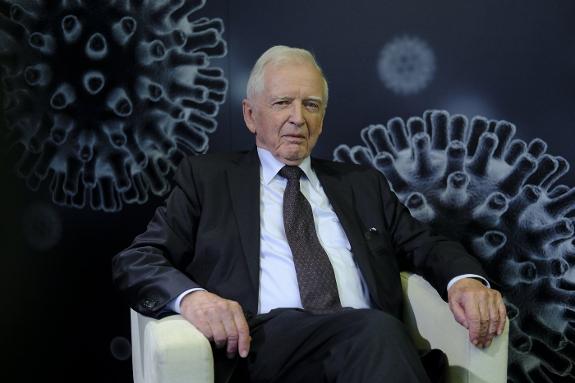

Sections
Highlight

VÍCTOR NÚÑEZ JAIME
Friday, 6 October 2017, 09:12
Compartir
Harald Zur Hausen is a German scientist who has been awarded the Nobel Prize for Medicine. He received it in 2008 for discovering that the human papilloma virus (HPV) is the principal cause of cervical cancer. He developed a vaccine to prevent it and, for more than a decade now, thousands of girls in different countries have been vaccinated so they don't suffer from it. The problem is that still not enough people have been vaccinated, he said recently, after speaking at a conference in Madrid on cancer research and prevention which was organised by the National Oncological Research Centre, La Sexta TV channel and the Axa Foundation.
HPV is the most common sexually transmitted virus, but 15 or 20 years can pass before the cancer appears and people may think they are not at risk, he warned. That is why he believes all girls should be vaccinated. But it should also be given to boys between the ages of nine and 14, before they start having sexual relations, because they are the main transmitters of the virus and, between 15 and 40 they tend to have more partners than women do. With the vaccine, we are protecting them and their partners, he explains. The vaccine against Human Papiloma is one of the safest, because there is only one case of adverse effects in every 100,000.
However, some parents have decided not to vaccinate their children, for example because it has been attributed to recent cases of measles.
I would say to anyone who has doubts about vaccinating their children that if they don't, they are putting their children and the environment in which they live at risk. You can't not vaccinate babies. The vaccines which were given to the people who are today parents and grandparents have contributed to the fact that in general health is better nowadays. And that is how it should continue, says Zur Hausen, who is the former president of the Cancer Research Centre in Germany.
In Spain, cancer is the second most common cause of death after cardiovascular illnesses. Thanks to research, drugs and preventive programmes are achieving survival rates which would have been unimaginable just two decades ago(80 per cent in some types, such as breast cancer).
In recent decades we have discovered that there is a link between numerous infectious agents and specific cancers, explains Zur Hausen. Around 21 per cent of cases can be related to virus infections, bacteria or parasites, and that has implications for the study and prevention of cancer.
He regrets the fact that measures are not being taken against damaging and determinant habits such as obesity and alcohol consumption, and as an example he talks of the policies which have been put into effect to control smoking, and have already resulted in fewer cases of lung cancer.
Changing habits
As a result of his research, he has changed some of his own everyday habits: he has stopped eating beef (because it could lead to colon cancer) and he walks every day. There should be more campaigns about the dangers of eating too much and the importance of a healthy diet, he says.
This scientist, who has also been a professor at American universities, was relaxed at this press conference, until someone reminded him of the controversy which arose after he won the Nobel Prize: two of the people who took part in the vote were linked to the AztraZeneca pharmaceutical company, which owns the patent for the vaccine against HPV.
That upset me a great deal because it had nothing to do with it. But in the end I decided not to take any notice, he says, bringing the subject to an end with a smile.
Publicidad
Publicidad
Publicidad
Publicidad
Reporta un error en esta noticia
Necesitas ser suscriptor para poder votar.